Resilience Speakers
Dino Zuppa

Dino Zuppa, Accessibility Standards Canada’s Acting CEO, also oversees the development of equity-based accessibility standards supported by pioneering research funded by Accessibility Standards Canada’s grants and contributions program.
Dino’s career spans more than 25 years. He led a number of strategic initiatives at all orders of government in Canada, and at an American University. Dino holds a Ph.D. and lives in Ottawa with his wife and two kids.
Jennifer Armstrong

Dr. Jennifer Armstrong is a board-certified Environmental Physician and a leading expert in Environmental Medicine, with over 25 years of experience treating patients with chemical sensitivities, chronic fatigue, fibromyalgia, and allergies. She is the founder and medical director of the Environmental Health Clinic in Ottawa, which she established in 1997. Today, her clinic serves over 2,000 patients and has a waiting list of 1 to 2 years, highlighting the growing demand for specialized care in environmental medicine.
A Unique & Transformative Medical Approach
Dr. Armstrong’s practice is exclusively dedicated to treating environmentally sensitive patients and those suffering from chronic illnesses linked to environmental exposures. Her treatment techniques have also shown benefits for autism, failure to thrive, asthma, depression, cancer, and other chronic conditions. The clinic environment is entirely perfume and chemical-free, ensuring a safe space for patients with chemical sensitivities.
Reflecting on her two decades of practice, Dr. Armstrong has observed remarkable patient outcomes:
✔ Patients who once relied on conventional medications are now drug-free, having learned how to avoid toxic exposures.
✔ Elderly patients maintain normal blood pressure, no diabetes, and no joint/muscle issues, despite their age, due to targeted environmental health strategies.
Education & Training
✔ B.Sc. in Biochemistry – Carleton University (1973)
✔ M.D. – University of Toronto Medical School (1977)
✔ Environmental Medicine Training – Under Dr. John MacLennan (1991-1994)
✔ Started Practice in Environmental Medicine – 1997
✔ Board-Certified Environmental Physician – American Academy of Environmental Medicine (AAEM) and the International Board of Environmental Medicine
✔ Past President, American Academy of Environmental Medicine (AAEM) (2008-2009)
Awards & Recognition
🏆 Award for Excellence in Environmental Medicine – Canadian Society of Environmental Medicine (2003)
🏆 Nominee, Woman of Distinction Award – YWCA (2004)
Innovative Treatment Methods
Dr. Armstrong integrates a holistic approach to care, combining evidence-based environmental medicine with complementary therapies. Her techniques include:
✔ Serial Dilution Allergy Testing
✔ Intravenous Vitamins & Minerals
✔ Allergy Serums & Ortho-Molecular Medicine
✔ Heavy Metal Chelation Therapy
✔ Oxygen Therapy
Recognizing the importance of multidisciplinary healing, she collaborates with naturopaths, homeopaths, acupuncturists, and massage therapists, acknowledging their role in helping patients regain health and resilience.
A Call for More Doctors in Environmental Medicine
Dr. Armstrong strongly advocates for more physicians in the field of Environmental Medicine, emphasizing the life-changing results she has seen in her patients. She finds her work immensely rewarding, as it empowers patients to take control of their health through education, detoxification, and environmental awareness.
Her dedication to advancing Environmental Medicine continues to make a profound impact on patient care and medical research, setting a high standard for integrative and preventive healthcare.
Caroline Barakat
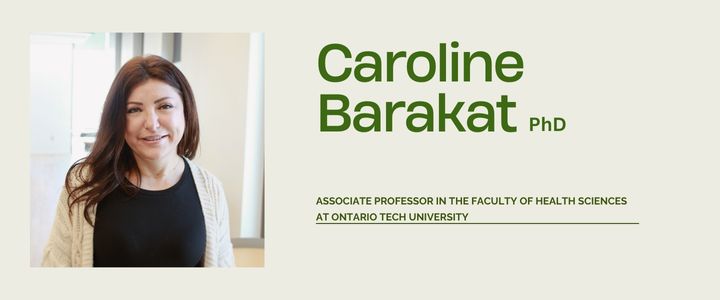
Dr. Barakat has extensive experience in longitudinal health studies and large-scale environmental health research. Her work has made significant contributions in areas such as:
✔ Air Pollution & Long-Term Health Effects – She was involved in a 30-year longitudinal study assessing the health impacts of air pollution exposure in children, contributing to the Hamilton Children Cohort Study (n=3,202, established in 1975).
✔ Environmental Exposure & Population Health – She designed and developed a comprehensive environmental exposure database for approximately 60,000 residents of the United Arab Emirates (UAE), integrating data on health behaviors and health outcomes.
✔ Neurological Conditions & Risk Factors – She participated in a national Canadian project that systematically reviewed risk factors influencing the onset and progression of 14 priority neurological conditions.
✔ Active Living & Toxin Exposure Reduction – She has led several Tri-Council-funded projects on sport participation for females, active living, and strategies for reducing exposure to environmental toxins.
Current Research Projects
Dr. Barakat continues to lead and collaborate on interdisciplinary studies addressing key public health and environmental challenges, including:
✔ Parental perceptions of girls’ participation in sports
✔ Development and evaluation of a mobile app to reduce paraben exposure
✔ Women’s knowledge, perception, and behaviors related to toxin exposure from personal care and household products
✔ Assessing childhood exposure to air pollution and its long-term health implications
✔ Exploring social and physical determinants of health across the life course
With her extensive expertise in environmental epidemiology, air pollution, and health equity, Dr. Barakat’s work plays a critical role in shaping public health strategies and policies aimed at improving health outcomes across diverse populations.
Paul Bérubé
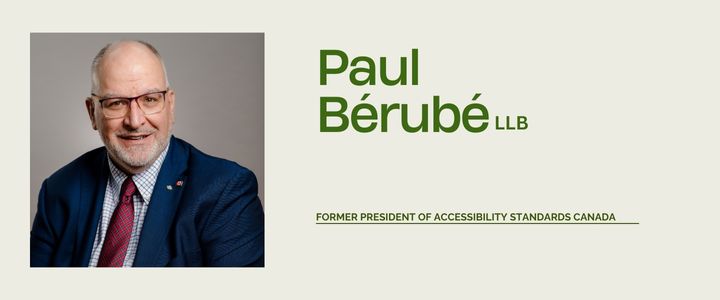
Lawyer and popularizer, governance specialist, lecturer and professional trainer.
Mr. Bérubé holds a Bachelor of Laws degree from Laval University. He is a member of the Quebec Bar and an honorary member of the Port-au-Prince Bar (Haiti). He holds honorary doctorates from two
universities in India (Lucknow and Prayagraj). He is also a consultant for the United Nations Human Rights Commission and a member of the International Senior Lawyers Project (New York, NY).
He was president of Independent Living Canada from 1999 to 2010. He is an international speaker on the protection of the rights of persons with disability, accessibility standards and inclusive leadership.
— (Japan, South Korea, France, Haiti, Kenya, South Africa South Africa, India, El Salvador, Argentina, Sri Lanka, West Africa, Central Africa, East Africa).
He is a professional trainer in inclusive governance and leadership and is the past chair of the board of directors of Accessibility Standards Canada. He is the vice-chair of the board of directors of the Canadian Soccer Association and corporate secretary of Humania Assurance.
Daniela Caccamo
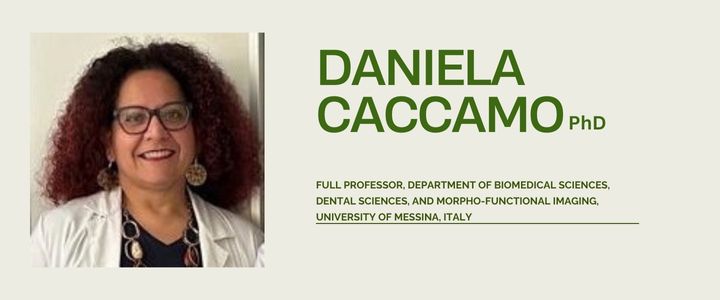
Dr. Daniela Caccamo is a Full Professor of Clinical Biochemistry and Clinical Molecular Biology at the University of Messina and the Director of the Unit of Clinical Biochemistry at Polyclinic Hospital University, Messina. She holds a Master’s degree in Biological Sciences and a PhD in bacterial systematics and biotechnological exploitation from the University of Messina, the University of Florence, and DSMZ in Germany.
With a distinguished career spanning over two decades, Dr. Caccamo has held various academic and clinical positions, including Associate Professor at the University of Messina and Biologist Executive at the Polyclinic Hospital University. Since October 2024, she has also served as Head of the International Medical School at the University of Messina.
Her research focuses on identifying molecular markers for multifactorial disorders, including neurodegenerative, inflammatory, and oxidative stress-related conditions, through in vitro, ex vivo, and case-control studies.
Nene Diallo

Nene Diallo is a researcher at the Environmental Health Association of Quebec, specializing in environmental justice. She holds a Bachelor’s of Science in Environmental Science from the University of Ottawa, a diploma in Environmental Management from the University of Toronto and a Master’s degree in Environment and Sustainable Development from the University of Montreal. Using qualitative methods, she explores the social and systemic factors that influence access to a safe and healthy environment.
Maureen Haan
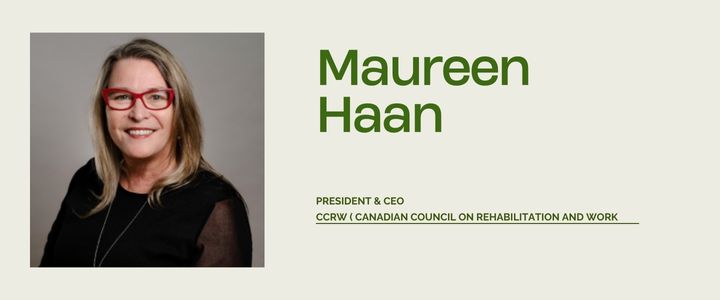
The Canadian Council on Rehabilitation and Work – CCRW
Maureen has been the President & CEO of CCRW since 2012. CCRW is the only national organization with the sole vision of equitable and meaningful employment for people with disabilities, in operation since 1976. Maureen provides insight to meaningful employment for people with disabilities and employer engagement through CCRW best practices and proven results.
Maureen has been active in the cross-disability sector, including involvement with Civil Society on the UN Convention of Rights for Persons with Disabilities (CRPD) as the lead for Article 27; leadership with the Disability and Work in Canada initiatives; co-development and leadership of the pan-Canadian Strategy on Disability and Work; and as a Board member on both Accessibility Standards Canada and the Canadian Association of Supported Employment (CASE). Maureen was appointed the Minister’s Disability Advisory Group (MDAG) at the beginning of the COVID-19 pandemic. Maureen’s awards include the inaugural Hummingbird Award from DAWN Canada.
Maureen started her career in the Deaf community and is fluent in American Sign Language (ASL). She lives in Thornhill with her husband and two sons.
Robert Lattanzio

Roberto Lattanzio is the Executive Director of ARCH Disability Law Centre. Robert joined ARCH as an articling student in 2003, and was a staff lawyer until taking on the Executive Director position in 2015. He has acted as legal counsel in test case litigation at all levels of court, including the Supreme Court of Canada, and has made law reform submissions to various levels of government, committees, and administrative bodies. Robert has been appointed to numerous advisory committees, and has written and guest-lectured on diverse topics including administrative law, education law, equality and human rights law, the Convention on the Rights of Persons with Disabilities, disability rights, capacity and supported decision making, legislative reform, and medical assistance in dying. Robert received his LL.B and B.C.L. law degrees with distinction from McGill University in 2003. Robert is the 2022 recipient of the Law Foundation of Ontario’s Guthrie Award for his contributions to advancing access to justice.
Shahir Masri
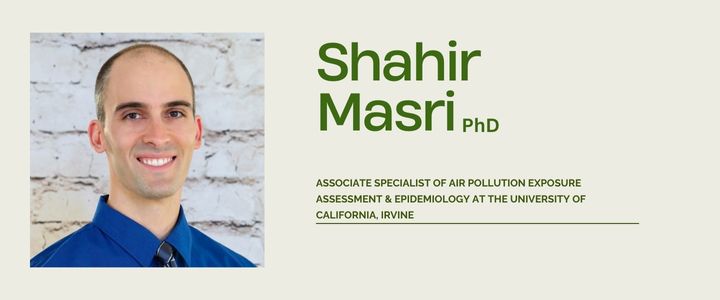
Dr. Shahir Masri is an Associate Specialist in air pollution exposure assessment and epidemiology at the University of California, Irvine, where he focuses on air pollution exposure modeling and climate change communication research. In addition to his role at UC Irvine, he is an adjunct faculty member at the Schmid College of Science and Technology at Chapman University, where he teaches courses on environmental health and pollution, and at National University, where he instructs online graduate and undergraduate science courses.
Education & Expertise
Dr. Masri earned both his Doctor of Science (ScD) and Master of Science degrees from the Department of Environmental Health at the Harvard School of Public Health. He completed his Bachelor of Science degree at the Institute of the Environment and Sustainability at the University of California, Los Angeles (UCLA).
Climate Advocacy & Public Engagement
In 2018, Dr. Masri founded “On the Road for Climate Action”, a national project aimed at raising awareness about climate change through educational events and public presentations across all 50 states. His outreach efforts focus on making climate science accessible and actionable for the public.
Writing & Research
Dr. Masri is the author of Beyond Debate: Answers to 50 Misconceptions on Climate Change, a book praised by the late Citizens’ Climate Lobby founder Marshall Saunders, as well as prominent scientists at MIT, UCLA, and other institutions. He has also written numerous opinion articles, which have been published in The Hill, the LA Times, Thrive Global, and other media outlets.
Currently, Dr. Masri is conducting research on:
✔ Exposure to harmful combustion-related air pollutants in the U.S. and internationally
✔ The presence of toxic chemicals in food, soil, and consumer products
He is the first author of over a dozen peer-reviewed scientific studies, published in leading academic journals. His work contributes to advancing environmental health research, public policy, and climate change communication.
John Molot
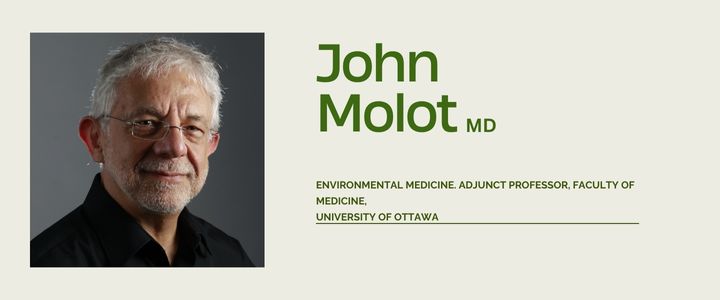
Dr. John Molot has focused his medical career on environmental medicine for 40 years and is now primarily dedicated to education and advocacy for environmental health. He is the medical advisor for the Environmental Health Associations of Quebec and Canada (EHAQ and EHAC). Presently, he is collaborating on the project Empowering Community and Removal of Barriers (ECRoB), the goals of which are to raise awareness across Canada about the legal rights of people with multiple chemical sensitivity (MCS) and other disabilities affected by the indoor environment. He has provided numerous educational presentations to provincial Human Rights Commissions, law societies, health professionals and medical students.
In 2007, he collaborated in developing The Medical Perspective on Environmental Sensitivities for the Canadian Human Rights Commission, which led to the Commission’s recognition of environmental sensitivities as a disability with the legal right to accommodation. In 2013, he wrote the Academic and Clinical Perspectives segment of a business case proposal to build a Centre of Excellence in Environmental Health, which led to the creation of the Ontario Task Force on Environmental Health (2016-18) to which Dr. Molot was appointed by the Minister of Health and Long-Term Care.
He has recently published peer-reviewed articles on MCS titled, Neurological susceptibility to environmental exposures: pathophysiological mechanisms in neurodegeneration and multiple chemical sensitivity and Multiple Chemical Sensitivity: It’s time to catch up to the science. Dr. Molot has also authored a book called 12,000 Canaries Can’t be Wrong.
Kenichi Azuma
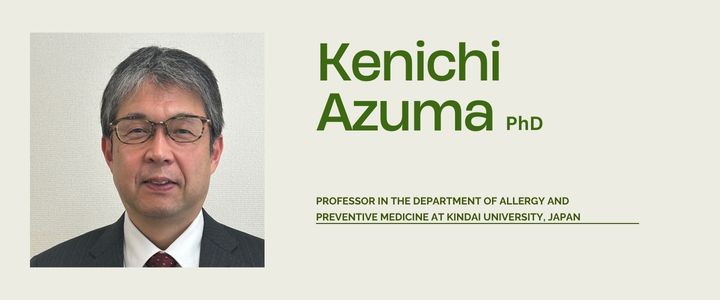
Professor Kenichi Azuma obtained his bachelor’s degree from Kobe University and later earned a PhD in Environmental Health from Kyoto University. He is currently a faculty member at the Kindai University Faculty of Medicine, where his research focuses on the physiological and psychological responses of humans to environmental factors. His expertise spans epidemiology, cardiovascular and respiratory diseases, cancer, infectious diseases, building-related symptoms/illnesses, chemical sensitivity, and health risk assessments related to environmental pollutants and pathogens.
Prof. Azuma holds qualifications as a Public Health Specialist and an Environmental Health and Preventive Medicine Expert. He actively collaborates with international, governmental, and non-governmental organizations, playing a key role in global health initiatives. His contributions include the development of the WHO Guidelines for Indoor Air Quality: Selected Pollutants, the WHO Housing and Health Guidelines, and the IARC Monographs on the Identification of Carcinogenic Hazards to Humans. Additionally, he has been instrumental in shaping Japanese air quality guidelines for ambient, indoor, and occupational environments.
His dedication to environmental health, public policy, and global health standards underscores his significant contributions to the field, advancing research and policies that enhance human well-being in diverse environments.
Melissa Pagliaro

Melissa Pagliaro, CCRW
Melissa Pagliaro (they/she) completed their MA in Forensic Psychology at Carleton University and has over five years of experience in quantitative and qualitative research, working on both academic and community-based projects. They also have five additional years of experience as an employment rehabilitation consultant and job coach, supporting individuals with disabilities. As a neurodivergent person with multiple disabilities, Melissa is passionate about and actively involved in disability advocacy, particularly in the areas of employment, income supports, and accessible, affordable housing. They currently collaborate on disability and employment research, evaluation, and policy analysis projects for CCRW. In their spare time, Melissa creates mixed media art and jewelry pieces, plays video games, and spends quality time with their two cats, Misha and Locki.
Ottaviano Tapparo
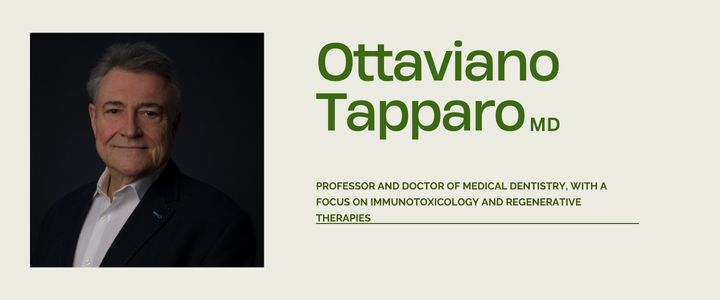
Dr. Vita Ottaviano Tapparo is a highly accomplished dentist, professor, and researcher, specializing in implantology, metal-free dentistry, laser therapy, and regenerative procedures. With a career spanning over four decades, his work has significantly influenced the fields of biocompatible dental solutions, posturology, and neural therapy.
Education & Academic Achievements
Dr. Tapparo studied dentistry at Friedrich-Alexander University in Erlangen from 1974 to 1979, earning his state examination in 1979. In 1981, he completed his Doctorate in Dental Medicine (Dr. med. dent.). His academic career expanded internationally, holding multiple associate professorships in implantology at prestigious institutions, including:
- 1992 – Associate Professor of Implantology at the University of Medicine and Pharmacy in Iași and Apollonia University in Iași
- 1993 – Associate Professor of Implantology at the University of Ovidius in Constanța
- 1993-1997 – Associate Professor at the University of Medicine and Pharmacy in Timișoara, where he founded and led the Chair of Implantology, was appointed Associate Professor for life, and successfully integrated implantology into the university curriculum. He also played a pivotal role in introducing English-language training into Romania’s university education system.
In 1997, Dr. Tapparo was accepted into the Romanian Academy of Medical Sciences, recognizing his groundbreaking contributions to medical research and education.
Professional Distinctions & Research Contributions
Dr. Tapparo’s expertise in biocompatible dental care and innovative treatment methodologies has led to several distinguished academic honors:
- 2003 – Honorary Professor (Prof. h.c.) at Lucian Blaga University in Sibiu
- 2014 – Visiting Professor at the Medical Institute of Traditional and Nontraditional Medicine in Dnipropetrovsk
Fields of Expertise & Innovation
Dr. Tapparo’s cutting-edge research and clinical practice focus on biocompatible, regenerative, and minimally invasive dentistry, particularly for patients with Multiple Chemical Sensitivity (MCS) and immunotoxicological concerns. His areas of expertise include:
✔ Development of protective measures for metal removal in dental procedures
✔ Individually tested, metal-free dentistry for MCS and immunotoxicologically stressed patients
✔ Diagnosis and treatment of dental foci/NICOs (Neuralgia-Inducing Cavitational Osteonecrosis) and the tooth-organ relationship (Author of the book ISBN 978-3-9817880-0-6)
✔ Advanced laser therapy for dental and oral health applications
✔ Regenerative procedures using autologous growth factors and CD 34+ stem cells
✔ Metal-free implantology, including autologous coating of titanium and zirconium implant surfaces
✔ Posturology and CMD (Craniomandibular Dysfunction) analysis, specializing in head rotation zone diagnosis (atlas-axis), particularly in cases of whiplash and vagus nerve disorders
✔ New neural therapy (Lamers-Tapparo method), utilizing procaine, NADH, and autologous platelet concentrates (CGF/Concentrated Growth Factors)
Dr. Tapparo continues to be a pioneering force in biocompatible dentistry, implantology, and interdisciplinary dental medicine, contributing to safer, patient-centered dental care approaches worldwide.
Adrianna Trifunovski
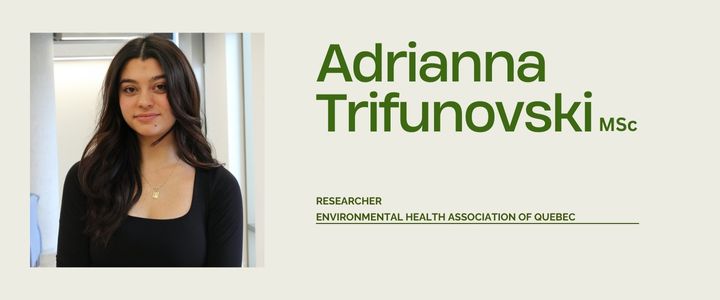
Adrianna Trifunovski is a researcher at the Environmental Health Association of Quebec. She holds a Bachelors of Health Science Degree from Ontario Tech University, as well as a Master’s degree in Health Science. Using mixed-methods approaches, Adrianna aims to identify how the environment affects population health, and believes everyone has a right to healthy environment, free of harmful toxins.
Kentaro Watai
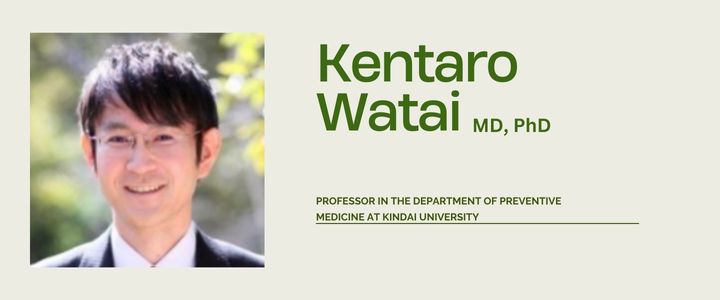
Dr. Watai is a distinguished physician, researcher, and lecturer specializing in allergy, preventive medicine, and respirology. Currently a Lecturer at the Department of Preventive Medicine and Behavioral Sciences at Kindai University Faculty of Medicine in Osaka, Japan, Dr. Watai also serves as Manager of the Center for Immunology and Allergy at Shonan Kamakura General Hospital and as a Visiting Researcher at Sagamihara National Hospital.
Education & Medical Training
Dr. Watai earned a medical degree (M.D.) from Kumamoto University in 2010 and later completed a Ph.D. at Juntendo University in 2018. Their career has been dedicated to advancing clinical research and patient care in allergy and respiratory diseases, with over a decade of hands-on experience in leading medical institutions across Japan.
Professional Experience
✔ 2010-2012 – Resident Physician, Sagamihara National Hospital
✔ 2012-2020 – Allergy & Respiratory Physician, Sagamihara National Hospital
✔ 2020-2022 – Chief of the Allergy Department, Sagamihara National Hospital
✔ 2022-Present – Manager, Center for Immunology and Allergy, Shonan Kamakura General Hospital
✔ 2022-Present – Visiting Researcher, Sagamihara National Hospital
✔ 2024-Present – Lecturer, Department of Preventive Medicine and Behavioral Sciences, Kindai University Faculty of Medicine
Research Contributions & Areas of Expertise
Dr. Watai’s research focuses on allergy, respiratory health, and preventive medicine, with significant contributions in the study of multiple chemical sensitivity (MCS). Their work has examined key factors related to MCS, including:
– Environmental exposures and their impact on allergy and respiratory health
– The role of vaccination history in immune system responses
– Gut microbiota alterations associated with delivery mode and their influence on allergic diseases
Dr. Watai has led genome-wide association studies (GWAS) and metagenomic analyses, uncovering molecular mechanisms underlying MCS and allergic diseases. Their dedication to integrating clinical practice with advanced research continues to shape the future of allergy, immunology, and preventive medicine in Japan and beyond.
Susan Yousufzai
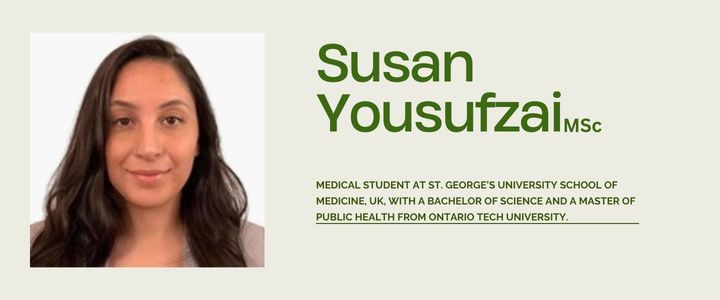
Susan Yousufzai is a Term 3 medical student at St. George’s University School of Medicine. She holds a Bachelor of Science and a Master of Public Health from Ontario Tech University. In addition to her medical studies, Susan serves as a research assistant at Ontario Tech and collaborates with ASEQ-EHAQ. Her research interests focus on preventive medicine and the determinants of health-related behaviors and outcomes.
Haris Theoharides MD
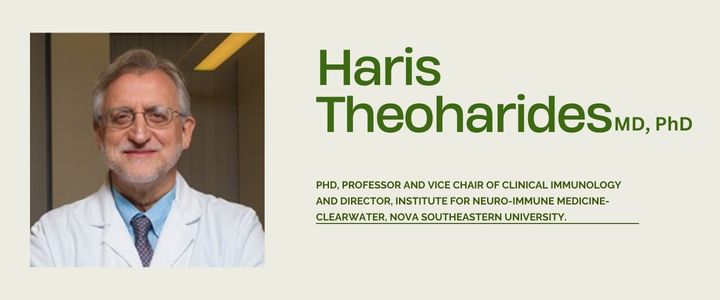
Dr. Theoharides, is Professor and Vice Chair of Clinical Immunology and Director, Institute for Neuro-Immune Medicine-Clearwater, Nova Southeastern University, FL and Adjunct Professor of Immunology, Tufts School of Medicine where he was Professor and Director of Molecular Immunopharmacology & Drug Discovery, and Clinical Pharmacologist, Massachusetts Drug Formulary Commission (1983-2022). He served on the Board of the Institute of Pharmaceutical Research and Technology (IFET) and the Supreme Health Council of the Ministry of Health in Greece. He received his BA, MS, MPhil, PhD and MD degrees and the Winternitz Price in Pathology from Yale University. He also received a Certificate in Global Leadership from Tufts Fletcher School of Law and Diplomacy and a Fellowship at Harvard Kennedy School of Government. He trained in internal medicine at New England Medical Center which awarded him the Oliver Smith Award “recognizing excellence, compassion and service.” He received the Tufts Distinguished Faculty Recognition and Excellence in Teaching awards multiple times. He showed that the unique tissue immune cells, mast cells, communicate with the brain microglia and are critical for neuroinflammation. He has 493 publications (49,406 citations;
h-index 113
placing him in the world’s top 0.05% of most cited authors and the worldwide expert on mast cells by ScholarGPS and Expertscape. He was inducted into the Alpha Omega Alpha National Medical Honor Society, the Rare Diseases Hall of Fame and the World Academy of Sciences. He developed novel dietary flavonoid supplements formulated in olive pomace oil to increase absorption. He has received 30 patents and trademarks (www.mastcellmaster.com; www.drtheoharides.com)
Melanie Langille MSc

Melanie Langille is the President and CEO of NB Lung. She is an environmental scientist with a background in human health risk assessment and contaminated site assessment with a specialization in vapour phase contaminants. She brings to the organization a strong science background, with a Bachelor degree in Biology and a Master’s degree in Environmental Science and a passion for knowledge sharing. Her previous experience in risk assessment, environmental impact assessment, and contaminated sites management gives her a unique perspective on the importance of the environmental and social determinants of health.
Shelley Petit B.ED, M.ED
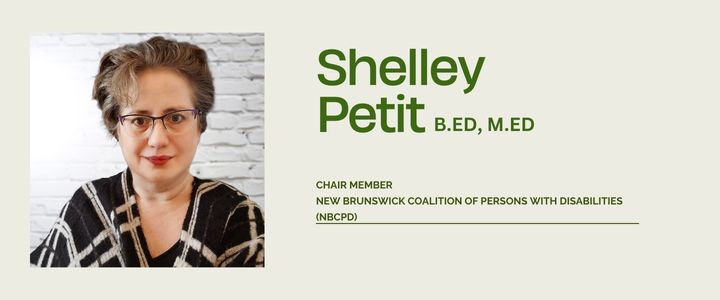
Shelley Petit BA, B.ED, M.ED- Shelley is the Chair of the New Brunswick Coalition of Persons with Disabilities (NBCPD). Before becoming housebound in 2019 from severe chemical intolerances (MCS/TILT), she was a teacher and long-time Girl Guide leader. She has 2 adult daughters, one with autism, so she has dealt with the system as a mom, as a client, and now as an advocate. Unfortunately, Shelley is now also dealing with the system as a cancer patient, with metastatic melanoma that is not operable. Cancer is hard enough, add in MCS and our choices to fight for survival become extremely limited.
As Chair of the NBCPD Shelley works with the board and members to advocate for better conditions for people with any type of disability, visible, invisible, physical, intellectual, mental, environmental, etc. A disability is a disability and until we all work together to fight the inequitable barriers placed on by society- none of us will move ahead nor receive the equity and equality we all deserve.
Its is far beyond time for: Accessibility, Dignity, Equity, Equality and Inclusion for all in Canada and the world. Together we have the numbers and the strength to make it happen.
Freda Uwa MD
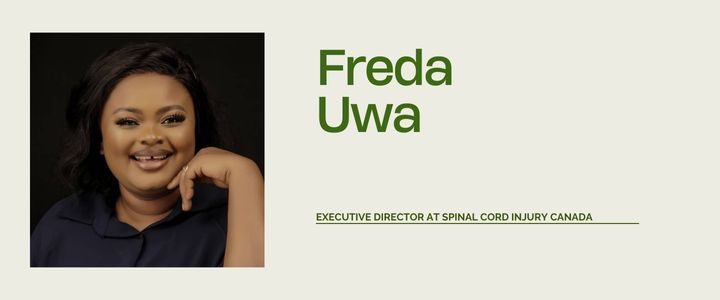
Freda is a leader with extensive experience in accessibility, mental health, and project management, informed by her lived experience and professional expertise. Her leadership within the Independent Living Canada network brings a forceful voice on behalf of all Canadians with disabilities. Her tireless efforts to ensure accessibility, inclusion and dignity for all is best witnessed in her genuine approach and perseverance pursuing the issues that matter most to persons with disabilities.
Having attained multiple academic honours including degrees in Nursing Leadership; Community Mental Health; and Management, Freda’s career spans healthcare, policy development, program implementation, and advocacy. With her strong focus on disability rights, accessibility standards, and equity, Freda is a Human Rights Consultant with the Washington Institute of Diplomacy and a lifetime member of the World Women Leaders Network. She is dedicated to empowering individuals and organizations to drive meaningful change.
Beyond her professional work, Freda is passionate about mentorship, social impact, and fostering inclusive communities. She is also an accomplished Canadian Red Seal-endorsed professional in the cook trade and loves to feed people great food!
Audrey Grant PhD
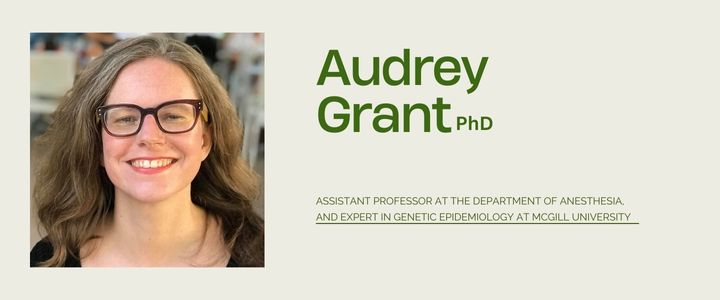
Audrey Grant is an Assistant Professor in the Department of Anesthesia. She has applied her expertise in Genetic Epidemiology and Statistical Genomics to the study of immunological traits and diseases, and more recently, to pain, especially the development of chronic pain. Currently, her laboratory conducts genome wide association (GWA) studies using large, publicly available clinical databases including the UK Biobank (UKB) and the Canadian Longitudinal Study on Aging, applying classical and new machine-learning approaches in combining GWAS test statistics with data from other tissue-specific expression or epigenetics sources, towards an integrative genomics to characterize the genetic architecture of pain phenotypes, and to parse environmental from genetic etiological components. The goal is to glean new insights on the pathophysiological implications of the underlying genetic architecture for downstream clinical intervention.
Bill Adair
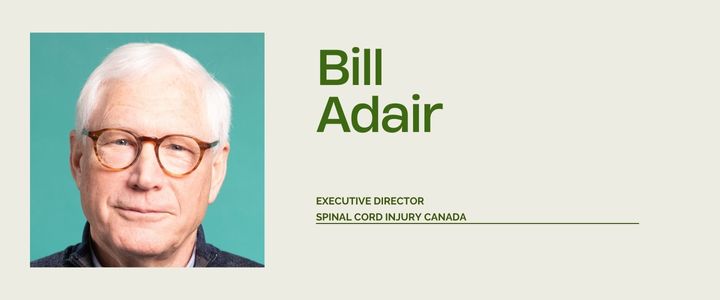
William Adair has extensive professional and community leadership experience in the areas of healthcare and disability. Mr. Adair’s career in the non-profit and public sectors employs collaborative and principled leadership that inspires all involved to achieve extraordinary results.
Mr. Adair was the National Patient Services Director at the Canadian Cancer Society for 13 years where he created a strategic plan to coordinate cancer control efforts throughout Canada. He was the first Executive Director of Wellspring, a psycho-social support centre in Toronto for people living with cancer. He participated on an international panel to evaluate the first five years of Europe Against Cancer. He was the CEO of Spinal Cord Injury Ontario for 23 years, increasing its budget from $2 million to over $10 million during his tenure.
Mr. Adair is presently the Executive Director of Spinal Cord Injury Canada, a consumer-driven federation that assists people with spinal cord injuries and other physical disabilities in achieving independence, self-reliance and full community participation.
He is a founding member of the Canadian Disability Policy Alliance, the Ontario Neurotrauma Foundation, Candlelighters Canada and the Dorothy Ley Hospice.
Most recently, Mr. Adair has devoted his leadership and expertise to the Government of Canada through the Canadian Access and Inclusion Project; the Federal Accessibility Legislation Alliance; the Working Group on Alternate Format Materials; the advisory group to the Canadian Human Rights Commission on Compliance with the CRPD/Optional Protocol, and to the Parliamentary Precinct Accessibility Advisory Panel. Mr. Adair also led the committee that developed recommendations for the Government of Canada’s Accessibility Communications policy. He is a member of the Accessibility Standards Canada Board of Directors. He is also a member of the Disability Advisory Group led by Canada’s Minister Responsible for Disability Inclusion.
Mr. Adair has a Bachelor of Science (University of Minnesota) and is a graduate of the Executive Leadership Course on the Management of Non-Profit Organizations (Harvard University). He received a Meritorious Service Medal from the Government of Canada in 2016.
Gail M. Eyssen MD
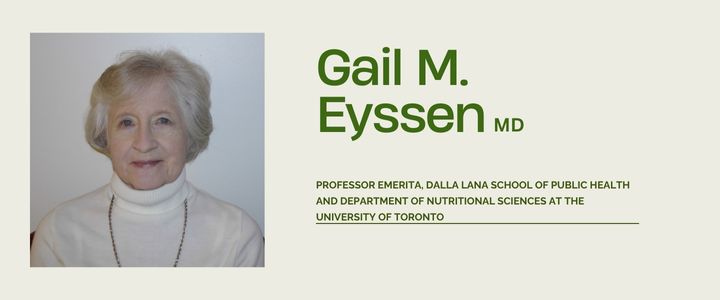
Dr McKeown-Eyssen received her doctorate in epidemiology from McGill University, Montreal, in 1975. As an assistant professor in the Department of Epidemiology and Biostatistics until 1979, she participated in studies of occupational health including health effects of asbestos exposure and of methyl mercury exposure in northern Quebec.
She joined the University of Toronto in 1979 and retired from the Dalla Lana School of Public Health in 2009. There, her primary research was on the relationship of diet to colon cancer and other solid tumours and the biological mechanisms involved. Through a cross-appointment in the Department of Nutritional Sciences, she also collaborated in studies of dietary factors associated with diabetes.
Her interest in Multiple Chemical Sensitivity began in 1989 when she was invited by the Ontario Ministry of Health to join the Minister’s Advisory Committee on Environmental Hypersensitivity where she served until 1992. She was a member of the Clinical Research Advisory Board on Environmental Hypersensitivity for the Ontario Ministry of Health from 1992-2000 and a member of the Environmental Hypersensitivities Advisory Committee for the Laboratory Centre for Disease Control, Health Canada from 1998-2001. She was the Principal Investigator for the Environmental Hypersensitivity Research Unit funded by the Ontario Ministry of Health from 1993-1998. She and her colleagues developed a reproducible questionnaire to assess all features of MCS which had been included in the seven case definitions then in use and identified those which were best able to discriminate between patients most and least likely to have MCS. Using the optimal case definition, the group investigated several biological hypotheses in a series of case-control studies and identified several genes associated with MCS.
